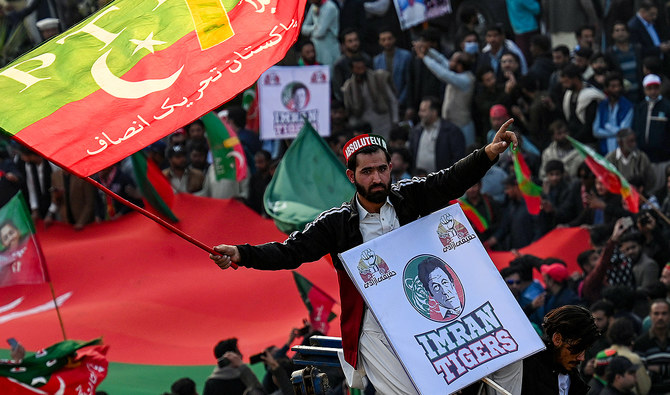ISLAMABAD: Former prime minister Imran Khan’s Pakistan Tehreek-e-Insaf (PTI) party on Sunday threatened a protest movement in case of failure of its negotiations with the government over the issue of the next national elections.
Both the sides engaged in talks earlier this week on the advice of the Supreme Court to break the impasse on elections in Punjab where the PTI along with its allies dissolved provincial assemblies in January to push the federal coalition government led by Prime Minister Shehbaz Sharif to hold early polls.
The government has so far insisted to hold the elections on the same day in October after expiry of five-year term of the national and provincial assemblies.
“PTI wants the success of negotiations [with the government], but it has formulated a strategy in case of failure,” PTI senior leader and part of the negotiations team said in a Twitter post.
“It is not possible for the PTI to sit silently if the Constitution is considered as a piece of garbage and the public as insects,” he said while calling on the people to prepare for a “massive movement.”
“The movement is starting tomorrow with rallies in Lahore, Islamabad, and Peshawar, culminating into a historic long march,” he added while referring to Labor Day rallies, one of which will be led by Khan in Lahore.
After two rounds of talks, the government and PTI teams are scheduled to hold a final round of negotiations on Tuesday in Islamabad. In the previous meetings, both the sides have shared proposals with each other for approval of their respective leaderships.
Speaking to party workers on Saturday night, Khan said the PTI wanted the government to dissolve the National Assembly before May 14, otherwise his party would go ahead with the Punjab elections as per the top court’s order.
The Supreme Court in its April 4 order fixed May 14 for Punjab polls, directing the federal government to provide funds worth Rs21 billion and extend all other necessary support including the security for national elections. The government rejected the idea of providing funds but relying on parliamentary proceedings.
Members of the ruling Pakistan Muslim League-Nawaz (PML-N) party has so far refused to budge an inch on its stance on holding the national elections in October.
“We are not ready to accept the diktat of Khan who is seeking the dissolution of the National Assembly,” PML-N senior leader Muhammad Talal Chaudhry told Arab News.
“We are holding talks with the PTI with absolute sincerity to bring political stability to the country,” he continued, “but such preconditions by the opposition will derail the negotiation process.”
Political analysts said both the PTI and the government wanted to achieve “desired results” from the talks, but were not willing to find a middle ground to break the weeks-long impasse over the elections.
“It is difficult to see a breakthrough in the talks as the coalition government, especially the PML-N, was involved in witch-hunt of the political opponents through arrests and raids at their homes,” political analyst and TV talk-show host Zarrar Khuhro told Arab News.
He said the PML-N was looking at a massive political loss if it went ahead with the elections, though the political situation for the party was not going to change even if the national elections were held in October.
“The PML-N is trying to drag out the talks as the elections for it is not a political issue now but a matter of political survival,” he said, adding that the party was using “destructive and ham-handed techniques” against political opponents in a bid to weaken them.
Adnan Rehmat, another political commentator, said the political crisis had turned into a judicial crisis with the top court’s insistence on elections in Punjab, adding this was also the reason why the PML-N was engaging with the PTI.
“We don’t see the PTI and the government agreeing on a unanimous date for the national elections through the talks,” he told Arab News. “It seems to be just a futile exercise.”
“The political crisis will deepen further in the coming days,” he continued. “It will only get worse before it gets better.”
















